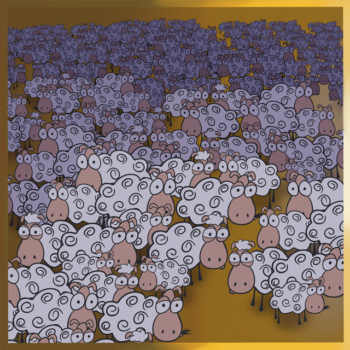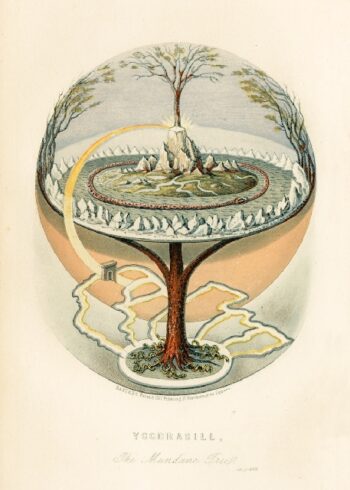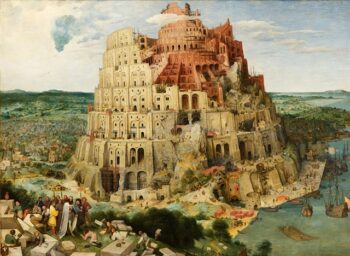Definition:
A religion is a structured collection of lies designed to limit language.
Etymology:
The word “religion” originates from the Latin word “religio,” which has several proposed meanings, including “reverence for the gods,” “conscientiousness,” or “scrupulousness.”
Another proposed root of the word “religion” is the Latin verb “religare,” meaning “to bind” or “to tie back.” This suggests a connection between religion and the idea of binding individuals to a set of beliefs, practices, or moral codes.
It is said that religion comes from the Latin verb “religare,” meaning “to bind” or “to tie back,” where “re” means again, and “ligare” means “to bind/tie/together.” So religion means reconnection. The concept is that we have always been connected to God, but have lost contact, and through religion, we shall be reconnected.
If we look at the etymology of the syllables in the more modern word “re-lig-ion,” we have the word/name “Re,” which is the Egyptian sun god (also known as Ra), the word “lig” which means “like/equal/similar/same,” and the word/name “Ion” which is Romanian for John, which is the English name for God from the Torah/Bible. So to summarize: re-lig-ion means Ra = John. The word religion tells us that the god Ra and the god John are the same God. This is an important point to understand regarding religion. Most religions focus on talking about the same things. They all have essentially the same concepts, stories, claims, words, and symbols. Only a few religious people are aware that their religion is not original but borrowed from other religions.
Articles:
Beginning and End
Definition: The term “beginning” refers to the initial point or starting phase of something, while “end” denotes the conclusion or final stage. These terms are often used to describe the…
Children’s Initiation Ritual
Definition: Children’s initiation rituals refer to ceremonies or rituals performed to mark the birth of children and/or their initiation into the community or religious fellowship. These ceremonies are about labeling…
Coming-of-Age Ceremony
Definition: A “coming-of-age ceremony” is a ritual or event that marks the transition from childhood to adulthood. Etymology: The term “coming-of-age” is derived from the notion of reaching an age…
Commemorative Day
Definition: A “commemorative day” is a designated day set aside to remember, honor, or celebrate a specific event, person, or cause. It often involves activities and ceremonies that reflect the…
Curse Word
Definition: A “curse word”, also known as a “swear word” or an “expletive”, is a word or phrase that is considered offensive or rude. Etymology: The word “curse” comes from…
Funeral
Definition: A “funeral” is a ceremony held to honor and remember a person who has died. It is a ritual that provides an opportunity for the deceased’s family and friends…
God’s Name
Description: The reason why it’s called a swear word is because the term comes from the verb “swear,” which originally meant to take an oath or make a solemn declaration,…
Herd Mentality
Definition: “Herd mentality,” also known as “sheep mentality,” “mob mentality,” “pack mentality,” or “group behavior,” refers to a behavior where individuals follow the actions of the crowd or group without exercising…
Holiday
Definition: A “holiday” is a designated day of celebration or observance, often marked by time off from work or school, special activities, and cultural or religious rituals. Holidays can be…
Language
Definition: A language is a structured collection of patterns associated with ideas. Language is the tool of communication. Etymology: The word “language” comes from the Old French word “langage,” which…
Logical Fallacy
Definition: A “logical fallacy” is an error in reasoning that renders an argument invalid. Etymology: The term “logical fallacy” comes from the Latin “fallacia,” meaning “deception” or “trick.” The term…
Love
Definition: The word “love” is a label for a complex and multifaceted emotion, encompassing feelings of deep affection, attachment, care, and compassion for someone, something or some idea. It comes…
Peace
Definition: “Peace” means the absence of noise or disturbance. Etymology: The English word “peace” originates from the Old French term “paix,” derived from the Latin “pax” (genitive pacis), meaning “peace,…
Prayer
Definition: “Prayer” is a fictional concept in which an individual communicates with a deity, higher power, or divine presence. It can involve expressions of praise, thanksgiving, confession, or supplication. Etymology:…
Sheep, Wolves and Shepherds
Definition: “Sheep, wolves, and shepherds” are often used metaphorically to represent different roles and dynamics within a group or society. Etymology: Sheep: From the Old English “sceap” or “scep.” Wolves:…
The Circle of Life
Definition: “The Circle of Life” is a fictional concept that refers to the cycle of birth, growth, reproduction, death, and renewal that is observed in all living organisms. This concept…
The Tree of Life
Definition: The Tree of Life is a fictional concept and typically refers to a symbolic tree in various religions. Etymology: The term “Tree of Life” comes from the concept of…
The Tree of the Knowledge of Good and Evil
Peter Paul Rubens – The Fall of Man (1628-1629). Charles Joseph Natoire – The Rebuke of Adam and Eve (1740). Definition: “The Tree of the Knowledge of Good and Evil,”…
The Word of God
Definition: The “Word of God” refers to the divine message or revelation communicated to humanity by God. This term is often used to describe sacred texts or scriptures that are…
The World Tree
Oluf Olufsen Bagge – Yggdrasil, The Mundane Tree (1847). The World Tree is illustrated as a massive tree holding up the world with its three branches. The world is inside…
Tower of Babel
Pieter Bruegel the Elder: The Tower of Babel (1563). Lucas van Valckenborch: Tower of Babel (1594). Gustave Doré: The Confusion of Tongues. Definition: “Babel’s Tower” is a fictional tower from…
Web of Language
Description: Religion works like a network in the brain. At the center of the web is the concept of God’s existence. In every cross of the web around the word…





